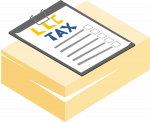Massachusetts LLC Taxes
In Massachusetts, LLCs are taxed as pass-through entities by default. Because of this, LLCs don't pay taxes directly. Instead, LLC profits are passed on to LLC members, who report their earnings when filing their individual income tax returns. LLC members must pay the federal self-employment tax, which is currently 15.3% (12.4% for social security and 2.9% for Medicare). Massachusetts collects state income tax from individuals at a flat rate of 5% and has a 6.25% sales tax rate.
In this article, we’ll cover:


How Are Massachusetts LLCs Taxed?
If your LLC is a single-member LLC (SMLLC), you’ll be taxed as a sole proprietorship—or “disregarded entity”—by default. Meanwhile, if you’re part of a multi-member LLC, you’ll be taxed as a partnership by default. The federal tax forms you’ll need to file as a single- or multi-member LLC are:
- Single-member LLC—Form 1040 (usually Schedule C, but some SMLLCs file C-EZ, E, or F)
- Multi-member LLC—Form 1065
Alternatively, Massachusetts LLCs can file under S-corp or C-corp status.
Massachusetts LLCs taxed as S-corp
LLCs are able to apply for S-corp tax status by filing Form 2553 with the IRS. S-corp status is a tax election available to both LLCs and corporations that meet IRS S-corp requirements, such as having fewer than 100 members. S-corps are taxed as pass-through entities and don’t have to pay corporate taxes. Additionally, S-corp owners don’t need to pay the 15.3% self-employment tax on any distributions they receive from the business. However, S-corp owners still need to pay self-employment tax on salary.
LLCs filing under S-corp status must use Form 1120-S. If you’re interested in filing as an S-corp, we recommend consulting with a CPA to make sure that S-corp status will financially benefit your business.
LLCs taxed as C-corp
You can choose to have your Massachusetts LLC taxed as a C-corp, which is the default filing status for corporations. Being taxed as a C-corp means that you’ll have to pay federal corporate taxes at 21% and Massachusetts corporate taxes at 8%. However, filing as a C-corp will qualify your LLC for more tax deductions and make your business more attractive to investors.
To file your taxes as a C-corp, you’ll submit Form 1120. Because filing as a C-corp is more complex than filing under default status, seek guidance from a CPA before making the switch.

Massachusetts State Income Tax
When filing under default status as an LLC in Massachusetts, you’ll pay individual state income tax. Massachusetts has a flat 5% individual income tax rate.
Multi-member LLCs must file Form 3: Partnership Return of Income to report their income to the state, even though LLCs don’t pay income tax directly.
LLCs filing as C-Corps must pay Massachusetts Corporate Excise Tax, which is 8% of a business’s taxable net income plus either a property measure (for tangible property corporations) or a net worth measure (for intangible property corporations). The property/net worth measure is levied at a rate of $2.60 per $1,000 of a corporation’s taxable Massachusetts tangible property or taxable net worth.
Though they are pass-through entities, LLCs taxed as S-corps must still pay the 8% corporate tax on certain types of income and the Massachusetts Corporate Excise Tax on either tangible personal property or net worth.
You can file your Massachusetts taxes online using MassTaxConnect. Find additional information about business taxes through the Massachusetts Department of Revenue.

Sales and Use Tax
Massachusetts charges a general sales tax of 6.25% on all sales and rental of tangible personal property and services. Some products and types of sales are exempt from sales tax—the Department of Revenue provides a list of tax-exempt items and sales.
Depending on how much your LLC makes, you’ll need to pay Sales /Use Tax annually, quarterly, or annually:
- $100 or less: Due annually
- $101 – $1,200: Due quarterly
- $1,201 or more: Due monthly
You can make Sales/Use Tax payments through MassTaxConnect.

Local Massachusetts Taxes
Depending on where your business is located and what kind of assets you have, you may need to pay additional local taxes. This includes municipal property taxes and vehicle excise taxes in cities like Boston and Worcester. Check with your local jurisdiction to find out which local taxes apply to your LLC.

Other Taxes in Massachusetts
As an LLC in Massachusetts, you may encounter some additional taxes.
Massachusetts State Employer Taxes
If you hire any employees, you’ll need to contribute to the state’s unemployment insurance fund and obtain workers’ compensation coverage.
- Unemployment Insurance (UI) Tax—In Massachusetts, employers are required to submit UI contributions on the first $15,000 they pay each employee every year. The UI tax rate is 2.42% for new employers not in the construction industry and 6.72% for new employers in the construction industry. After 3 years, the Department of Unemployment Assistance calculates the employer’s UI tax rate based on the employer’s reserve percentage (employer’s account balance divided by the 3-year wage average). Based on the Department’s UI Tax Rate Schedule, rates can vary from 0.56% to 18.55% based on an employer’s reserve ratio.
- Workers’ Compensation—All employers in Massachusetts must provide their employees with workers’ compensation insurance. In Massachusetts, you can obtain coverage through a private insurer or even self-insure if you meet Department of Industrial Accidents Office of Self Insurance requirements. If you’re unable to find private coverage, you can apply for the Massachusetts Workers’ Compensation Assigned Risk Pool. Rates for workers’ comp depends on the level of risk associated with the work your employees perform and your claims history.
Industry Taxes
The Massachusetts Department of Revenue levies some additional industry-specific business taxes, such as:
- Alcoholic Beverage Excise
- Cigarette and Tobacco Tax
- Marijuana Retail Sales Tax
- Sales Tax on Meals
- Room Occupancy Excise Tax
- Motor Fuel Excise
Find information on industry taxes on the Department of Revenue’s Business Taxes page.

Do foreign LLCs in Massachusetts need to pay Massachusetts taxes?
As the owner of a Massachusetts foreign LLC, you’ll need to pay all applicable Massachusetts taxes, including Sales/Use Tax, UI tax if you have employees, and any industry taxes. If you’re filing taxes as an individual under default status and make over $8,000 in taxable income in Massachusetts during the calendar year, you’ll also need to file and pay Massachusetts income tax.





